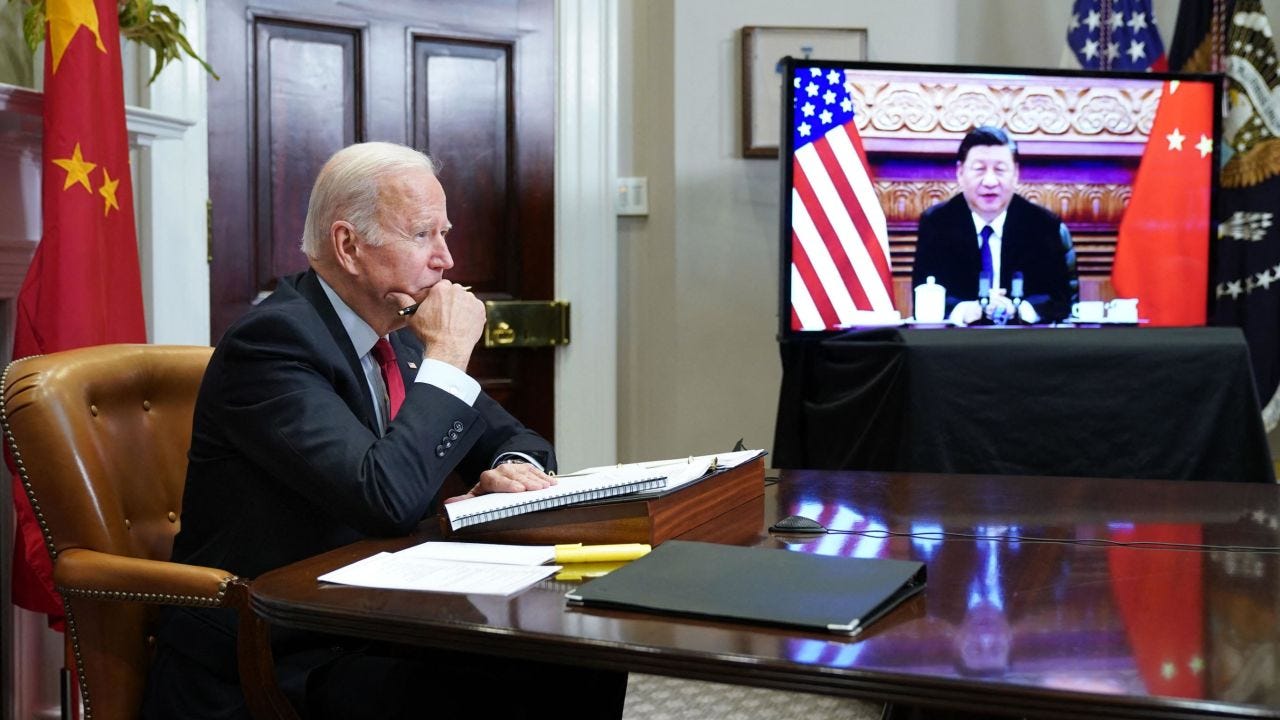Wanted: A Narrative for China Policy
President Biden has put all the pieces the table but has yet to fit them together to create a clear and compelling picture for the American public

It’s a rare thing these days: an area where Democrats and Republicans actually share common ground.
That’s certainly been the case with America’s policy toward China, where both parties have pushed for a more assertive approach toward Beijing. The Senate passed the CHIPS and Science Act last summer with fourteen Republican votes, with co-sponsor Sen. Todd Young (R-IN) calling the legislation a way to counter “Beijing’s bet to beat America.” Two dozen House Republicans likewise defied their leaders to vote for the bill in the House, sending it on to President Biden’s desk for approval.
But all that may change if Republicans take control of one or both houses of Congress in next week’s mid-term elections. Despite organizing partisan opposition to the CHIPS and Science Act, House Minority Leader Rep. Kevin McCarthy (R-CA) has already promised investigations on China across a wide range of issues – some of them legitimate like supply chain and human rights concerns, others nakedly political and partisan like a probe into Hunter Biden’s business dealings. (Never mind former President Trump’s own extensive business ties to the Chinese government.) All in all, it looks like China policy will become less and less an area for bipartisan cooperation and more and more a partisan wedge issue as Republican politicians aim to paint President Biden and Democrats as soft on China.
Nothing could be further from reality: Biden’s approach to China, while not perfect by any means, has accomplished more in two years than his predecessor managed in a full term in office. Let’s take a look at three major policy moves the Biden administration has made on China:
AUKUS: The deal between the United States, Australia, and the United Kingdom to provide Australia with nuclear-powered submarines was ineptly handled and poorly executed in its unveiling, precipitating a diplomatic row with France (which had contracts to build conventionally-powered submarines for Australia). But it still represents a strengthening of ties with an important Pacific ally and builds up its military capabilities over the long term.
Industrial policy: The Biden administration’s three main legislative achievements – Infrastructure Investment and Jobs Act, the CHIPS and Science Act, the Inflation Reduction Act – represent an ambitious attempt to reinvigorate America’s economy and retool it to better compete with China. Taken together, these investments in semiconductor manufacturing, carbon-free energy, and infrastructure aim to lay the foundation for American competitiveness over the long haul.
Semiconductor export controls: In October, the Commerce Department issued sweeping new restrictions on the export of semiconductors and other critical advanced computer parts to China – severely curtailing Beijing’s “ability to obtain advanced computing chips, develop and maintain supercomputers, and manufacture advanced semiconductors.” Though largely unnoticed outside niche policy and journalism circles, these limits represent a decisive use of American economic and technological power to curb the geopolitical ambitions of a potential rival.
Beyond these three main policy moves, the Biden administration has rightly resisted calls to appease Beijing made by a number of self-proclaimed progressives terrified that a “new Cold War” might emerge.
For its part, China faces growing troubles at home exacerbated by maximum leader Xi Jinping’s drive to consolidate power in his own hands. He’s sidelined virtually all domestic political rivals in the ruling Chinese Communist Party – former head of state Hu Jintao was even physically removed from the recent twice-a-decade party congress for reasons that remain murky at best.
Moreover, the Chinese government’s zero-COVID policy has led to draconian lockdowns across the country, hurting the domestic Chinese and global economies in the process. It’s an approach that only creates additional incentives for the United States and other companies to decrease their economic dependence on China. Making matters worse for Beijing, a new consensus has emerged that China’s economy won’t grow larger than America’s until the back half of the century – if indeed it ever does.
But most Americans don’t understand their country’s policy toward China – and what they don’t understand they can’t be expected to support. Despite all the positive moves the Biden administration has made to invest in America and lay the foundation for future prosperity, it hasn’t been able to connect what it’s doing at home to what it’s doing in the world in a meaningful way. The Biden team’s dense and jargon-filled national security strategies certainly don’t help on this front, and there remains a desperate need for better public opinion data here.
More worryingly for both the administration and the country, this failure to communicate leaves a political vacuum that demagogues will be more than happy to fill – and Republicans look set to do so if they take the reins in Congress next year. Transforming China policy into a partisan wedge issue won’t make America’s approach any more effective, but it will make it harder to forge consensus across party lines on an issue that’s become a rare point of bipartisan consensus. That would do as much to hobble America as anything the Chinese government could do. Worse, it would create a hothouse political atmosphere that can lead to bad policy decisions – just as anti-communist fervor during the Cold War led to poor choices like the Vietnam War and the Iran-contra scandal.
It's still possible for the Biden administration to weave a new narrative that ties its domestic investments to its China policy approach. The building blocks of this narrative exist, but neither President Biden nor his foreign policy team have managed to tie them together in a clear and compelling way.
If next week’s elections go as many now predict, this task will only grow in importance – and become more difficult too.


